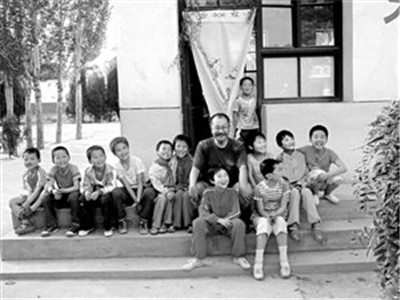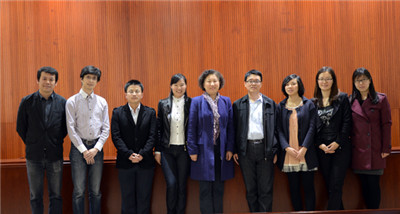 On March 7, 2014, a silk banner reading “Good education is like a spring breeze and rain, brining help like fuel delivered in the snow,” and a letter of thanks, were presented by a relative of a student to the Academic Affairs Department of the Open University of China(OUC). The banner and letter expressed the family’s appreciation to the department.
On March 7, 2014, a silk banner reading “Good education is like a spring breeze and rain, brining help like fuel delivered in the snow,” and a letter of thanks, were presented by a relative of a student to the Academic Affairs Department of the Open University of China(OUC). The banner and letter expressed the family’s appreciation to the department.
 March 16 marked Professor Wu Hongqing’s 60th birthday and his retirement from the Open University of China (OUC), formerly known as China Central Radio and Television University, (CCRTVU). Choking back emotion as he spoke, Wu said, “When I was young, I didn’t feel the passage of time. Only now, as I look back upon the past, do I realize how short life is.
March 16 marked Professor Wu Hongqing’s 60th birthday and his retirement from the Open University of China (OUC), formerly known as China Central Radio and Television University, (CCRTVU). Choking back emotion as he spoke, Wu said, “When I was young, I didn’t feel the passage of time. Only now, as I look back upon the past, do I realize how short life is.
 On March 6, the Experimental School of Binhai New District of the Open University of China (the OUC) was founded at Tianjin Radio and TV University (RTVU). Yang Zhijian, the President of the OUC, and Feng Xuefei, the President of Tianjin RTVU, signed the agreement between the two universities to co-sponsor the OUC Experimental School of Binhai New District.
On March 6, the Experimental School of Binhai New District of the Open University of China (the OUC) was founded at Tianjin Radio and TV University (RTVU). Yang Zhijian, the President of the OUC, and Feng Xuefei, the President of Tianjin RTVU, signed the agreement between the two universities to co-sponsor the OUC Experimental School of Binhai New District.
After several rounds of narrowing down the field, through such means as online voting and expert selection, the “OUC's Top Ten News Stories of 2013”, hosted by the Open University of China (OUC) and China.org.cn, and organized by the OUC Channel of China, were announced a few days ago.
“This software is good. The characters are big enough”, “It includes old films”, “Typing is barely needed and it's convenient to use”… Recently, in a class for senior citizens at Wenzhou RTVU, the students were learning to use a fantastic APP, “Sacred Gear”, the mobile version of “Senior Citizen's Education Network of Wenzhou” designed and developed jointly by Wenzhou RTVU and Beijing Superstar Company, which is the first APP specifically designed for seniors in Zhejiang Province.
 Recently, the on-the-job training programme for community workers in Fujian Province, undertaken by Fujian RTVU, has achieved success through all phases of development and implementation. With the publication of two textbooks entitled “Community Work Practice” and “An Introduction to Social Work” on the 15th of March, Fujian RTVU has completely finished all the work of platform setup, construction of curriculum textbooks, and the production of video courses for the on-the-job training and degree education for community workers in the whole province.
Recently, the on-the-job training programme for community workers in Fujian Province, undertaken by Fujian RTVU, has achieved success through all phases of development and implementation. With the publication of two textbooks entitled “Community Work Practice” and “An Introduction to Social Work” on the 15th of March, Fujian RTVU has completely finished all the work of platform setup, construction of curriculum textbooks, and the production of video courses for the on-the-job training and degree education for community workers in the whole province.
The results of “Liaoning’s 2013 Person of the Year in Education”, sponsored by multiple entities including the Department of Education of Liaoning, Liaoning TV Station, and Liaoning Daily were unveiled recently, with Ji Changhong, the director of the General Affairs Infrastructure Construction Division of Liaoning RTVU making the list.
 On March 26th, eight staff members from the Open University of China (OUC) were invited by the Party Committee of Departments directly under the Ministry of Education (MOE) to assist in the exchange and knowledge-sharing activity about information technology application known as “Information Technology Makes Work and Life More Convenient”, which was organized for the cadres within certain departments of the MOE.
On March 26th, eight staff members from the Open University of China (OUC) were invited by the Party Committee of Departments directly under the Ministry of Education (MOE) to assist in the exchange and knowledge-sharing activity about information technology application known as “Information Technology Makes Work and Life More Convenient”, which was organized for the cadres within certain departments of the MOE.